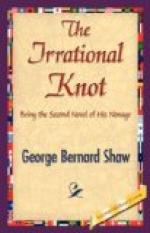He took her candle and led the way out without another word or a look at the bed. Marian, as he stood aside to let her go downstairs before him, was suddenly seized with a fantastic fear that he was going to kill her. She did not condescend to hurry or look back; but she only felt safe when they were in her room, and he no longer behind her.
“Sit down,” he said, placing the candle on the mantelpiece. She sat down at the table, and he stood on the hearthrug. “Now,” said he, “about the future. Are you coming back? Will you give the life at Holland Park another trial?”
“I cannot,” she said, bending her head almost on her hands. “I should disgrace you. And there is another reason.”
“It is not in your power, nor in that of all London, to disgrace me if I do not feel disgraced. It is useless to say that you cannot. If you say ‘I will not,’ then that will settle it. What is the other reason?”
“It is not yet born. But it will be.”
“That is no reason to me. Do you think I shall be a worse father to it than he would have been?”
“No, indeed. But it would be unfair to you.” He made an impatient gesture. “I dont understand you, Ned. Would you not rather be free?”
“Freedom is a fool’s dream. I am free. I can divorce you if I please: if I live with you again it will be by my own choice. You are free too: you have burnt your boats, and are rid of fashionable society, of your family, your position, your principles, and all the rest of your chains forever. You are declassed by your own act; and if you can frankly give a sigh of relief and respect yourself for breaking loose from what is called your duty, then you are the very woman I want for a wife. I may not be the very man you want for a husband; but at all events you are free to choose, free to change after you choose if you choose me, free anyhow; for I will divorce you if you refuse; and then you will be—independent—your own mistress—absolute proprietor of your own child—everything that married women and girls envy. You have a foretaste of that freedom now. What is it worth? One or two conditions more or less to comply with, that is all: nature and society still have you hard and fast; the main rules of the game are inviolable.”
“I think it is a good thing to be free,” said Marian, timidly.
“That means ‘I will not.’”
“Not ‘will not’; but I think I had better not.”
“A characteristic distinction, Marian. I once thought, like you, that freedom was the one condition to be gained at all cost and hazard. My favorite psalm was that nonsense of John Hay’s:
’For always in thine eyes, O Liberty,
Shines that high light whereby the world
is saved;
And though thou slay us, we will trust
in thee.’
And she does slay us. Now I am for the fullest attainable life. That involves the least endurable liberty. You dont see that yet. Very well: you have liberty—liberty to hurt as well as help yourself; and you are right to try whether it will not make you happier than wedlock has done.”




